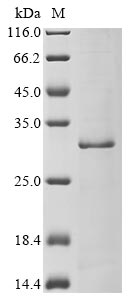Recombinant Escherichia coli Microcin J25-processing protein mcjB is produced using an E. coli expression system and includes the complete protein sequence from residues 1 to 208. The protein features a dual-tag design with an N-terminal 10xHis tag and a C-terminal Myc tag, which makes purification and detection more straightforward. SDS-PAGE analysis indicates the product achieves purity levels above 85%, suggesting it should perform reliably in research settings.
Microcin J25-processing protein mcjB appears to be essential for the maturation and secretion of the antimicrobial peptide Microcin J25 in Escherichia coli. This protein likely plays a key role in post-translational modification processes and may be important for understanding how bacteria defend themselves. Studying this protein could provide insights into bacterial peptide processing pathways and contribute to research on microbial interactions and antibiotic development.
Potential Applications
Note: The applications listed below are based on what we know about this protein's biological functions, published research, and experience from experts in the field. However, we haven't fully tested all of these applications ourselves yet. We'd recommend running some preliminary tests first to make sure they work for your specific research goals.
Escherichia coli Microcin J25-processing protein mcjB is a bacterial protein that requires precise folding for its role in microcin biosynthesis. The E. coli expression system is homologous to this bacterial protein, significantly increasing the probability of correct folding. The N-terminal 10xHis-tag and C-terminal Myc-tag are relatively small and positioned at opposite ends, minimizing interference with functional domains. While the homologous system supports proper folding, experimental validation remains essential to confirm functional activity.
1. Protein-Protein Interaction Studies Using His-Tag Pull-Down Assays
This application's reliability depends on proper folding validation. Protein-protein interactions within the microcin J25 pathway require precise tertiary structure. If correctly folded (verified), the protein is suitable for identifying physiological binding partners. If misfolded/unverified, there is a high risk of non-specific binding or interaction failure.
2. Antibody Development and Validation Using Dual-Tag System
Antibody development relies on antigenic sequence recognition rather than functional folding. If correctly folded (verified), the protein excels for generating conformation-sensitive antibodies. If misfolded/unverified, it remains highly suitable for producing antibodies against linear epitopes.
3. Biochemical Characterization and Enzyme Kinetics Analysis
These studies are essential for determining folding status and functional competence. If correctly folded (verified), characterization provides reliable data on enzymatic activity and kinetic parameters. If misfolded/unverified, analysis yields physical property data, but enzymatic assays will not reflect native activity.
4. Protein Complex Assembly and Stoichiometry Studies
Complex assembly requires precise tertiary and quaternary structure. If correctly folded (verified), the protein enables valid studies of complex formation and stoichiometry. If misfolded/unverified, assembly experiments will yield misleading results.
Final Recommendation & Action Plan
The homologous E. coli expression system provides favorable conditions for this bacterial protein, but experimental validation of structural integrity and functional activity is essential before reliable use in interaction and complex studies. Begin with Application 3 (Biochemical Characterization) to assess folding quality through techniques like size-exclusion chromatography and validate enzymatic activity using microcin J25 precursor substrates. Once correct folding and activity are verified, proceed cautiously with Applications 1 and 4 for interaction studies and complex assembly. Application 2 (antibody development) can proceed immediately regardless of folding status. If misfolding is detected, limit applications to linear epitope antibody production and basic biophysical characterization, avoiding all functional interaction and complex studies. For reliable mcjB research, always include appropriate activity controls and consider using tag-free variants for critical functional assays.






